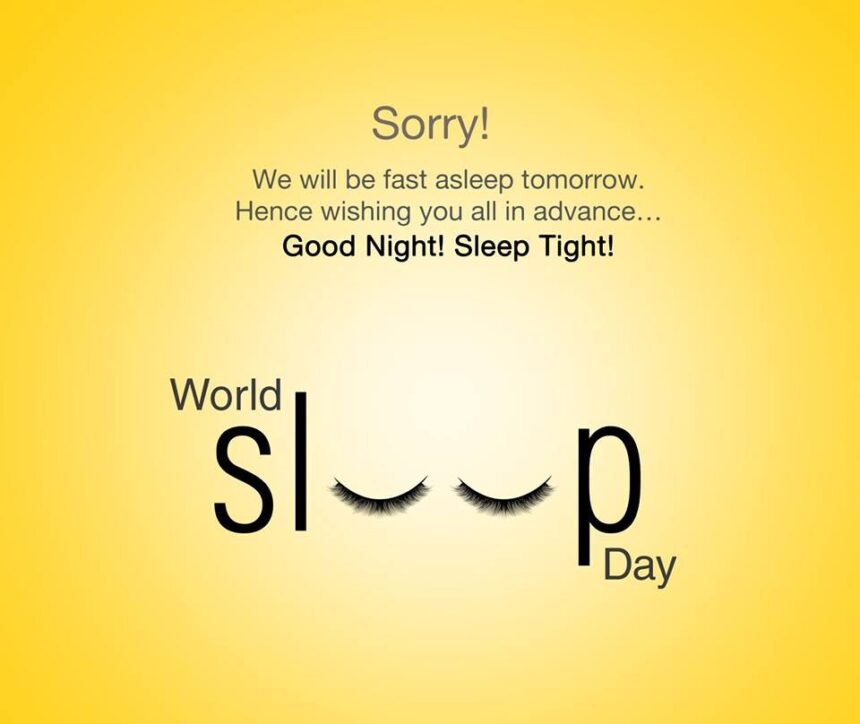🛌 World Sleep Day: 9 Powerful Reasons Why This Day Can Transform Your Health and Happiness
Observed on: The Friday before the Spring Vernal Equinox (March each year)
- 📜 History of World Sleep Day
- 📆 Timeline of Key Events
- 💤 9 Fascinating Facts About Sleep and World Sleep Day
- ❓ Frequently Asked Questions (FAQs)
- Q1: What is the main goal of World Sleep Day?
- Q2: Who organizes World Sleep Day?
- Q3: Why does the date of observance change?
- Q4: How can people participate?
- Q5: Is insomnia the only sleep disorder?
- 🌍 Significance of World Sleep Day
- 🎉 Global Observance and Activities
- 💬 Inspiring Wishes and Messages
- 🧠 Importance of Sleep in Daily Life
- 📢 Key Messages and Takeaways
- 🧭 Real-World Impact of World Sleep Day
- 📌 How You Can Participate
- ⚠️ Challenges That Remain
- 🌟 Conclusion: Sleep is a Right, Not a Privilege
In today’s fast-paced world, sleep often takes a backseat. But did you know that sleep is just as crucial to your survival as food and water? To spotlight the essential role of quality sleep in maintaining physical, mental, and emotional well-being, the world observes World Sleep Day every year.
This globally recognized day isn’t just about getting more rest—it’s about creating awareness of sleep health, understanding sleep disorders, and empowering people to live healthier, more balanced lives.
Let’s journey through the origins, impact, and real-world importance of World Sleep Day—and why it deserves your attention.
📜 History of World Sleep Day
World Sleep Day was first celebrated in 2008, initiated by a group of dedicated healthcare professionals under the World Sleep Society (formerly World Association of Sleep Medicine – WASM).
Its mission was clear:
“To lessen the burden of sleep problems on society through better prevention and management.”
Today, it’s observed in over 70 countries and supported by doctors, educators, mental health professionals, and public health bodies alike.
📆 Timeline of Key Events
| Year | Milestone |
|---|---|
| 2008 | First World Sleep Day initiated by World Sleep Society |
| 2013 | Official themes introduced annually |
| 2020 | Theme: “Better Sleep, Better Life, Better Planet” |
| 2023 | Theme: “Sleep is Essential for Health” |
| 2025 | Theme: “Sleep Equity for Global Health” (Expected) |
💤 9 Fascinating Facts About Sleep and World Sleep Day
Humans spend about 1/3 of their lives sleeping – that’s nearly 25 years for the average person!
Sleep deprivation affects over 45% of the global population.
People with sleep apnea are 4x more likely to suffer from heart disease.
Teenagers today average 6.5 hours of sleep, well below the recommended 8–10 hours.
Lack of sleep costs the global economy over $400 billion annually in lost productivity.
More than 80 sleep disorders have been identified, yet many go undiagnosed.
REM sleep (when dreams occur) is vital for memory consolidation and emotional processing.
Good sleep boosts immune system response, helping fight infections.
Sleep hygiene education has been proven to improve school and work performance.
❓ Frequently Asked Questions (FAQs)
Q1: What is the main goal of World Sleep Day?
To raise awareness about the importance of good sleep and reduce the global burden of sleep disorders through education and proactive care.
Q2: Who organizes World Sleep Day?
It is organized by the World Sleep Society, supported by sleep researchers and healthcare professionals worldwide.
Q3: Why does the date of observance change?
It is held on the Friday before the Spring Vernal Equinox, making the date variable each year.
Q4: How can people participate?
From webinars, school programs, doctor consultations, sleep challenges, to social media campaigns with hashtags like #WorldSleepDay and #HealthySleep.
Q5: Is insomnia the only sleep disorder?
Not at all. Common disorders include:
Sleep apnea
Restless leg syndrome
Narcolepsy
Circadian rhythm disorders
Parasomnias (e.g., sleepwalking)
🌍 Significance of World Sleep Day
Sleep is not a luxury—it’s a biological necessity. The significance of World Sleep Day lies in:
🧠 Promoting mental health and cognitive clarity
❤️ Supporting cardiovascular and immune function
👨⚕️ Spreading awareness about chronic sleep disorders
📚 Educating children and adults on sleep hygiene
🏥 Highlighting the link between sleep and disease prevention
It’s about building a world that understands and respects sleep as essential—not optional.
🎉 Global Observance and Activities
Across the globe, World Sleep Day is celebrated with creativity and purpose:
India: Sleep awareness camps and social media drives
United States: Virtual webinars and sleep health screenings
Japan: Research publications and youth education
Europe: Doctor-led campaigns on sleep and mental health
Africa: Community outreach to reduce stigma around sleep disorders
💬 Inspiring Wishes and Messages
😴 “Celebrate this World Sleep Day by giving your mind and body the rest they truly deserve.”
🌙 “Good sleep is not a dream—make it your reality.”
🛌 “Invest in rest—it pays off in health, happiness, and hope.”
🌃 “Let sleep be your superpower this World Sleep Day.”
💫 “Sleep well. Live better. Smile more.”
🧠 Importance of Sleep in Daily Life
A good night’s sleep is more than just restful—it impacts every corner of our daily functioning:
✅ Mental Health:
Lack of sleep is linked to depression, anxiety, and emotional instability.
✅ Learning and Memory:
Sleep enhances memory recall, concentration, and problem-solving skills—especially in students.
✅ Physical Health:
Deep sleep helps with muscle repair, heart function, and maintaining blood sugar levels.
✅ Workplace Performance:
Well-rested employees are more focused, less irritable, and significantly more productive.
📢 Key Messages and Takeaways
Quality sleep equals quality life.
Sleep disorders are real and treatable.
Everyone—regardless of age—needs proper rest.
Societies that sleep better, perform better.
Sleep is not a sign of laziness—it’s a strength.
🧭 Real-World Impact of World Sleep Day
Reduces the stigma around sleep problems and mental health.
Encourages early intervention through education and healthcare access.
Empowers parents, schools, and employers to make sleep a priority.
Stimulates national policies for better work-rest balance and flexible schedules.
📌 How You Can Participate
Even small steps can make a big difference:
Turn off digital screens 30 minutes before sleep.
Keep a consistent sleep schedule—even on weekends.
Avoid caffeine after 2 PM.
Create a peaceful sleep environment—cool, dark, and quiet.
Advocate for sleep education at schools and workplaces.
⚠️ Challenges That Remain
Increasing digital screen time and blue-light exposure
Overworked professionals compromising sleep
Mental health stigma around insomnia or oversleeping
Lack of sleep clinics and specialists in rural or underdeveloped regions
Poor urban planning affecting quiet sleep environments
🌟 Conclusion: Sleep is a Right, Not a Privilege
In the race for success, sleep often becomes the first sacrifice. But you can’t pour from an empty cup. World Sleep Day is a vital reminder that rest is productive, not wasteful.
Whether you’re a student, a working parent, a retiree, or an entrepreneur—sleep is your natural reset button. Prioritize it, respect it, and educate others to do the same.
Let March’s World Sleep Day be your gentle nudge to dream bigger—not by doing more, but by resting well.








